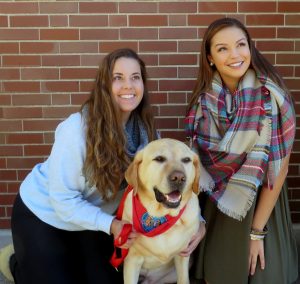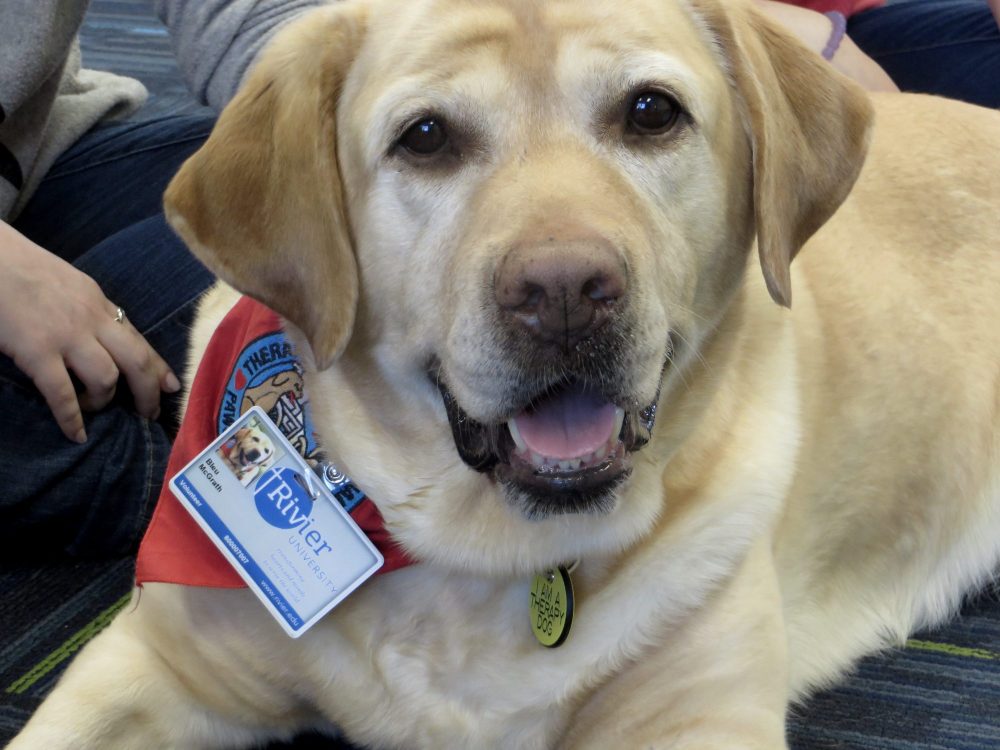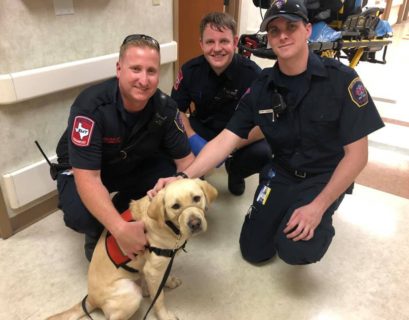by Deb McGrath
Pets are humanizing. They remind us we have an obligation and responsibility to preserve and nurture and care for all life.-James Cromwell
The vast number of programs within which canines play a very important role in fulfilling human needs and wants. They go far beyond the partnership initially developed thousands of years ago.
Why are we so entranced by dogs? For many of us, it is because our dogs not only teach us much about life, love, and becoming better human beings, but they have also proven time and again their willingness to do things for us. Scientific research, along with a plenty of anecdotal evidence, provides data that consistently proves that dogs can make our lives better. And, it is because of this ever-evolving and deep bond between our two species that dogs have earned the well-deserved title of “Man’s Best Friend.”

Gus Dreher, who has Deschene’s Muscular Dystrophy and his service dog, Millie taken by his Mom, Tonya Dreher shortly after Millie came home with them from New York to Peterborough, NH.
Humans have bred, raised, and trained dogs to be workmates, sporting dogs, and show dogs. We have search & rescue dogs, alert dogs, comfort and/or service dogs, therapy dogs, and emotional support dogs. We have purebreds, mixed breeds, and designer breeds. We have K9s in our military and police departments… and we have all heard the stories of canines who have given their lives in the line of duty for our sake. We know how invaluable search & rescue dogs can be.
More recently, we have come to realize how alert dogs can be the differentiating factor between life and death. We also understand the importance of service dog skills and tasks – and how their human partners are better able to live fuller, richer, more independent lives as a result. For so many who are dealing with serious medical issues, sleep patterns and deteriorating mobility create an array of emotional hurdles. A service dog is there 24/7 not only to close drawers, open doors, pick things up from the floor, etc., but to sleep by its human’s side and simply be there to provide the companionship as well as a level of safety.
Therapy dogs provide comfort to those in the workplace, hospitals, nursing homes, hospice centers, schools, libraries, colleges, and universities. News stories show specially trained therapy dogs helping first responders as well as survivors cope in the aftermath of disasters. We have learned that reading to a therapy dog in a school or library can decrease a child’s anxiety about reading aloud, while also increasing a student’s confidence and performance when utilized in conjunction with more traditional or formal academic programs. A therapy dog can help encourage reluctant learners for whom other programs have failed. Therapy dogs can become a victim’s best advocate by their mere presence when testifying in court, and/or by helping returning veterans transition into civilian life when suffering from PTSD.

This is our therapy dog Bleu visiting at Rivier University in Nashua, NH on Fresh Check Day which is a program for all students to bring awareness of the services available to reduce stress and increase awareness of mental health issues. Bleu is one of the “stress reducing services”!
Emotional support dogs not only help humans cope with life’s stresses, but also improve their quality of life and sense of well-being. These dogs provide the gift of affection and companionship on an everyday basis to those suffering from physical, emotional, and psychological issues. They improve lives tremendously by being there when these individuals are feeling anxious or alone. and These well-behaved and sweet dogs are often allowed on flights, in hotel rooms, and in hospitals to provide the support their person needs to reduce anxiety And for those who are feeling isolated and left out, these dogs provide unconditional love, companionship, and non-judgmental companionship they are seeking and help them take those first steps to health, hope, and a positive sense of well-being.
Innovative training and rehabilitation programs in prisons have been developed to rescue dogs shelters and have them trained by selected inmates prior to being placed, in order to increase the dog’s chance of remaining in its forever home – whether as a family pet, an emotional support dog, or as a service dog. Prison programs provide not only a second chance for shelter dogs, but also for the inmates by potentially reducing the rate of recidivism.
In this stressful world, those of us lucky enough to own dogs have personally experienced the extremely subtle, calming effect and joy our buddies provide by simply looking into their soft eyes or through a simple touch. For us, there is no doubt that our dogs do indeed make our lives richer and fuller. As a result of this amazing bond between humans and canines, it is not surprising that we continue to learn how large a role play dogs can play in human lives, both as traditional pets and as a highly trained service dogs. To from this wonderful breed, we need to pay attention and live in the present, so that we might better enjoy, pay attention to, and appreciate those amazing moments and simple pleasures we may too often miss if it were not for Man’s Best Friend.








